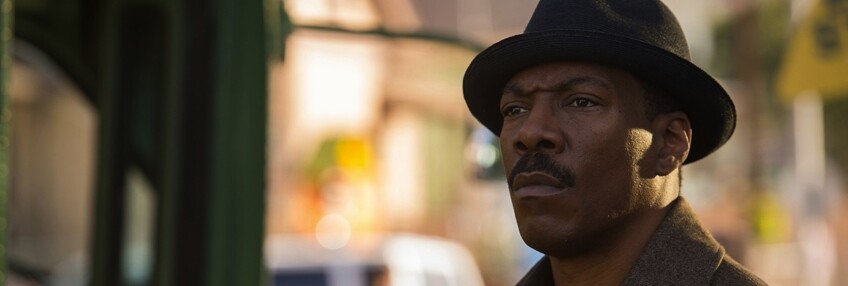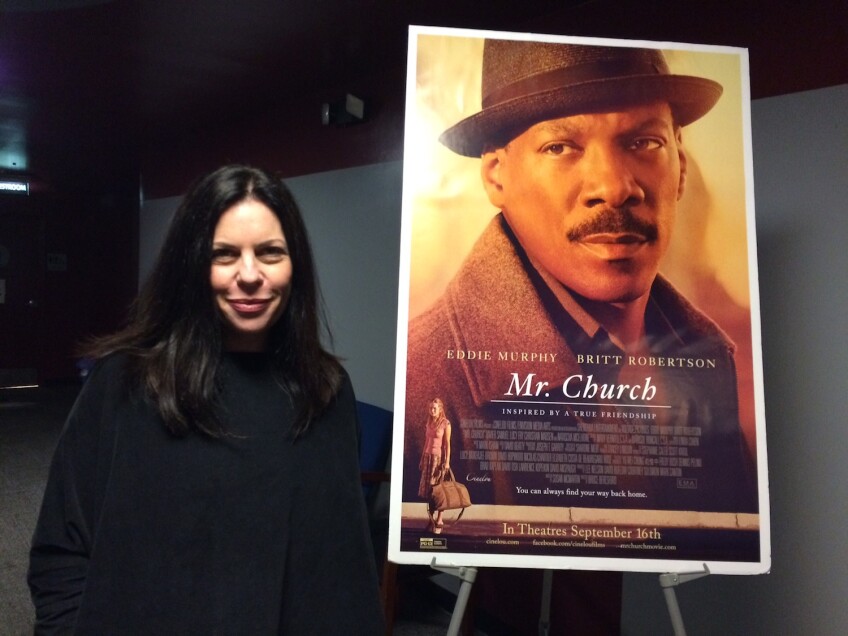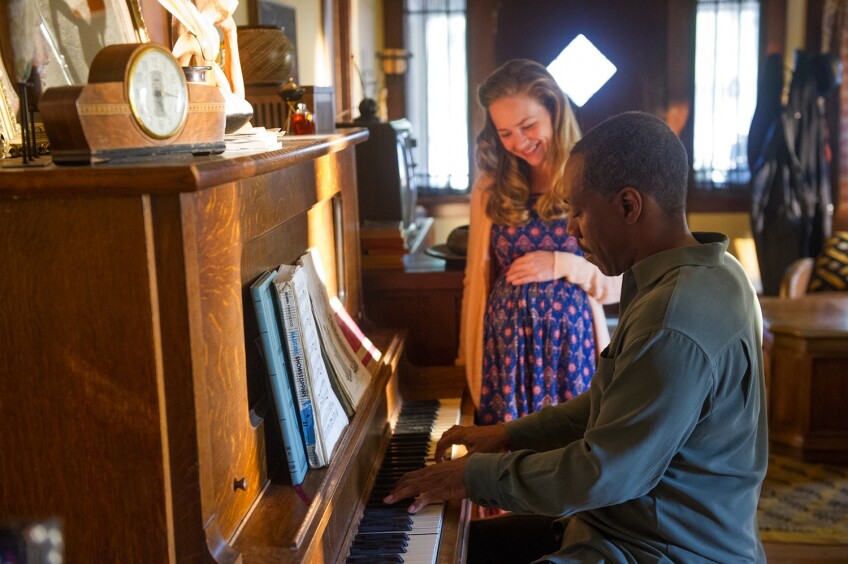'Mr. Church' Writer Susan McMartin on Eddie Murphy, and the Real Man Who Inspired the Film


The KCET Cinema Series continued its fall season at the historic Aero Theatre in Santa Monica on September 13 with "Mr. Church." The drama stars Eddie Murphy as a cook who comes into the lives of a young girl and her terminally ill mother and forms an incredible bond with them. Following the screening, writer Susan McMartin talked with KCET Cinema Series host Pete Hammond about the inspiration behind "Mr. Church." An edited version of their conversation appears below.
The fall season of the KCET Cinema Series is generously sponsored by the James and Paula Coburn Foundation. Screenings continue weekly at the Aero Theatre through October 10. Individual tickets are available on the night of the screening. For more information, see kcet.org/arts/cinema_series/.
On the inspiration for "Mr. Church."
This is based on a real friendship. There was a real Mr. Church in my life. He went by a different name, but it's based on our friendship.
He came into my life when I was a little girl, just like in the movie. My mom was very sick with cancer and he stayed in my life until the day he died. I always knew that I wanted to write a story about our friendship because it was so unique and he was so important in every aspect of my life — childhood, becoming a writer, everything — and I always knew that one day I wanted to write about us. I never knew how I wanted to tell the story.
I had a baby and he passed away before my baby was born and it was very sad that they would never know each other, that they would never meet, that she would never know this person who raised me and that he would never know her. I thought, well, I'm a writer. I can write a story where they meet. That's how it started. Then I went back to the beginning.
I always say that it's inspired by true friendship because everything about the friendship in the movie, about our bond, about what he gave me, what he taught me, our love for each other, who he is, is all real. Then I took creative liberties — two of the main ones being my daughter, he never met my daughter, so I created that story, I am a single mom. The other thing, my mom survived her cancer. She's actually here tonight. It's funny because I always feel bad. I'm sorry to tell you, my mom is still alive.
On killing the mom in "Mr. Church."
I've talked to my mom. My mom was dying of cancer and he was in our life and she is a miracle. She is a total miracle. I've talked to my mom about this. After she survived her cancer, for many years, I lost my relationship along with my mom, to alcoholism. He became — and that's like a death in itself — extremely important to me. I didn't want to write the movie about my relationship with my mom and go down that road. I really wanted to focus on the friendship, so I chose to give you a romantic exit and kill you.
I killed my mother. And I did it in such a beautiful way. I think it's pretty poetic.

On the theme in "Mr. Church."
I think that's what I love about this story. And you see it at the end when Jelly approaches and doesn't even know he cooks, that idea that we all know different parts of each other and everybody has their own story with somebody. My story with the real Mr. Church was one of a father figure, a best friend, a teacher, where, in somebody else's life, he was a piano player. I love that we all have different relationships. In my life with him, the one thing he always did want was privacy. I always felt like, here's a man who gave me everything, if the only thing he's asking for is his privacy, I have to honor that. I didn't want to put in a fake, I'm going to reveal some really weird secret about him just for the sake of Hollywood and storytelling. Because I think that sometimes we fall into that trap. Audiences need everything tied up in a neat bow and that's not how life is. I don't know every aspect, but I know what I was supposed to know and the important things of this man. I knew everything that he wanted me to know about who he was and, in his death, just like in life, I wanted to honor his privacy.
On the length of time it took to get "Mr. Church" made.
My daughter was a baby and she's now in high school. It took braces and birthdays.
I wrote it very quickly. It really poured out of me. Once I knew, the first line of dialogue came to me while I was taking a walk and I, every day, wrote. Didn't outline it. It really just poured out of me. For five years, it was in the hands of Sam Jackson and his management and they optioned for five years. So, for five years, we were trying to get it made. We would either have Sam or we would lose the director. Or, we would have the director and we would lose Sam. It just didn't happen. Then it sat on the shelf for three more years. Just sat.
What I love is that I wrote this because my daughter was never going to get to meet the real Mr. Church, but in a weird way, she has grown up with him in our home. She has seen her mom do everything to get this movie made and so then, about two years ago, my manager was in a meeting and he gave the script over to, he was in a meeting for a whole different project, but as he left he thought of my script and he said, "Would you be willing to read this?" Lee Nelson and David Buelow read it and decided, yes, we want to make this and then Mark Canton and Courtney Solomon came on board.

On casting Eddie Murphy in the title role.
Once it came back off the shelf, we had Bruce Beresford and we had the producers. We decided, let's rethink who we want for the movie. We had gone down Sam years ago. It's time to start approaching and we all said Eddie Murphy, but, of course, it was a dream. He won't do it. This isn't his type of movie. This is a small movie. It's a drama. Mark Canton said, "I'm sending it to him anyway." Eddie, halfway through reading it, apparently, he cried and called his agent and called Mark and said, "I want to do it." That was one of the best calls ever.
I've said this to a few people, but I think it took this long to get made because it was waiting for Eddie Murphy. I think he's so incredible. He really resembles the real Mr. Church. It was uncanny. He didn't grill me for a lot of information. He said everything I need to know is on the page. He looked at two pictures and all the artwork in the movie is the real Mr. Church's, except for the painting of Natascha, obviously. We have them in my home. My mom has one in her home. My sister has one. I have a sister. She's not in the movie because she wasn't really in our home during this time of this friendship.
On her friendship with the person who inspired Mr. Church.
He came into my life, actually, when I was four-and-a-half, but we made her 10 because we wanted to be able to give her dialogue. He was in my life all the way into my late-late 20s/early 30s. He was just the most, everything you see in this movie was true. He could do anything and he did it with so much humility and grace. It was just who he was. I said, this was a man who made me feel seen, when I didn't think I was being seen or heard. He really made me feel safe and seen and loved and I think my feeling was, I wanted to honor him and let him know that I saw him too. I loved him as much as he loved me.
A lot of the reason for the voice over in the movie is because so much of my relationship, was a lot of observations, not necessarily conversations, just being in his presence.
I loved being around him all the time. He was just beautiful and kind and graceful and smart and just an amazing person. I feel so lucky that I had this friendship.
That's why it says it's inspired by true friendship and not based on a true story because I hate when you go to a movie and it says based on a true story and you find out some of these things. That's why I was very specific. It's inspired by a true friendship. Then there's a lot of — but everything about our friendship is absolutely true.

On working with director Bruce Beresford.
I think that Bruce, it's not about he directs movies about a black person and a white person. Race was never, ever, talked about between the real Mr. Church and myself. That's why it's not in the movie. We never talked about it. It was never part of our dialogue. It was just love, unconditional love and family.
I think Bruce, even in "Driving Miss Daisy," that was during a time period where race was much more of a discussion and he was clearly working for Jessica Tandy and it was a different thing. I think, at the heart of it, Bruce responds to stories about friendship and unconventional relationships.
He said to me, what he responded to was this friendship. He said, "It felt like I was reading a visual poem." It felt like a poem, but a movie.
I was so spoiled on this project. Bruce was amazing. He allowed me to be involved in every step of it. Every word, are my words.
I was on the set. I was in casting. I was in post. I was in the editing rooms. If he needed to trim something or change something, he had me do it. It never happens that way for writers. You usually turn your script in and then you buy your tickets a year-and-a-half later and see the movie and go, is that what I wrote? To have him, everybody, even Eddie said, "I've never been on a movie where the script I read is actually the script I shot." He was so happy. He said, "I'm so used to getting new pages every day." Everyone honored the story and I felt really spoiled in that way. And Bruce was fantastic with the actors, with the children, with Eddie. Here's Eddie doing a role, a drama, and the two of them worked so well together.

On Britt Robertson, who co-stars in the film as Charlotte.
She was amazing. She's such a smart actress and so kind. She has to do so much in this movie because she has to not only mature and have a baby and all of that, but she has to do things that aren't necessarily likable, like being angry at your mom when she's dying. That's a very real reaction to somebody who is slipping away sometimes, to do things that are not necessarily the popular emotion. But that's what's real — to be so sad that somebody is sick or dying or leaving you or not there that you're angry and they're not even gone yet. I just thought Britt was amazing and she worked so hard and she's kind to everybody. She's great with the kids. She was so sweet to my daughter. Even at the premiere, the first thing she said to me was, where's your daughter? Just a very kind young woman. I felt really lucky that she played the part.
On the inspiration for other characters in the film.
They're all kind of based on real people. I was definitely in love with the most beautiful 10-year-old boy, on this or any other planet, for many years.
He's not in my life right now, but he was for many, many years. Larson is based on a person that I know — people that I know. Poppy is kind of a combination of two friends of mine. I took — everything is based on real experience and then storytelling because, of course, I want to be a writer as well and make sure that I'm telling a story. But, everything is based on real.
The person who is Owen, I hope he goes and sees it. My friends who I grew up with are still in my life and they know that I took pieces of them for Poppy. And Larson is not somebody who, he represents a couple of alcoholics who have been in my life.